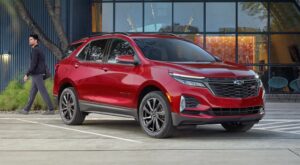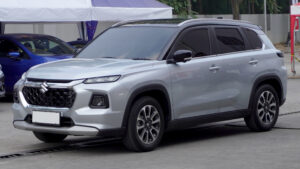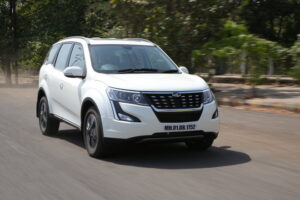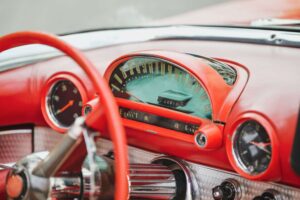Experiencing jerking while accelerating in your Subaru can be both concerning and frustrating. This issue disrupts smooth driving and hints at underlying problems that need attention.
Subaru jerking when accelerating is often caused by faulty spark plugs, clogged fuel injectors, a failing fuel pump, transmission problems, or a dirty MAF sensor. To address the problem, inspect and repair the affected components.

In this article, we will detail the potential causes, symptoms, and effective solutions for this problem. If you’re looking for more information about Subaru, begin your exploration with Carsdensity.
Car Jerks When Accelerating – Causes and Solutions!
Clogged Air Filter:
What happens when your car jerks due to an air filter that has become dirty and obstructed by road pollutants like dirt and debris? A clogged filter leads to inefficient fuel combustion, which can cause jerking during acceleration.
Damaged Fuel Lines:
Jerking can occur when the fuel lines are damaged, preventing the smooth transfer of fuel throughout the engine. Leaks or broken pipes can worsen the situation, potentially leading to dangerous consequences.
Faulty Carburetor:
A damaged carburetor that fails to properly mix fuel and air can disrupt the fuel combustion process, causing the car to jerk during acceleration.
Moisture in the Distributor Cap:
Cold weather can lead to moisture buildup in the distributor cap, causing engine misfires and jerking when accelerating. This issue is common in winter and can be prevented by parking the car in a dry, warm place.
Contaminated Fuel System:
A dirty fuel tank, clogged filter, or polluted injectors can disrupt the fuel flow to the engine, causing jerking. Routine cleaning and upkeep can help avoid this issue.
Improper Engine Tuning or Blockages:
An improperly tuned engine or blockages within the engine can lead to jerking as gases fail to flow out properly. Tuning the engine and removing any blockages can eliminate the jerking problem.
Misaligned Wheels:
If your car jerks but the engine seems fine, the issue may be poor wheel alignment. Misalignment or low tire pressure can cause the car to move slowly or jerk, especially after a collision.
Driver Error with Manual Transmission:
Jerking in cars with manual transmissions is often a result of driver error, particularly when shifting from neutral to first gear or starting on a slope. Practice and smooth operation of the clutch and gas pedal can prevent this.
Worn Spark Plugs:
Faulty spark plugs can lead to engine misfires and jerking. Regular replacement and maintenance of spark plugs and wires can help avoid these issues.
Ignition System Failures:
If your spark plugs are functioning correctly but jerking persists, the ignition system may be at fault. Modern cars with computer-controlled ignition systems may need to be checked by a professional.
Clogged Catalytic Converter:
A clogged catalytic converter can restrict exhaust flow, causing jerking and stuttering when accelerating. Cleaning or replacing a clogged converter can resolve this issue.
Worn Acceleration Cable:
A worn or damaged acceleration cable can cause delayed acceleration and jerking. Replacing the cable promptly is crucial to prevent further issues.
Damaged Motor Windings:
Worn or broken motor windings can lead to jerking, especially during heavy acceleration. Using an Ohmmeter to check for winding damage can help identify the issue, and a mechanic can assist with repairs.
Read Also: Subaru Crosstrek Years to Avoid – A Deep Dive!

Less Common Causes of Subaru Jerking When Accelerating
Exhaust System Blockages:
A clogged catalytic converter or exhaust system can restrict the flow of exhaust gases, leading to jerking.
Symptoms: Poor acceleration, sulfur-like odor, or overheating.
Solution: Inspect the exhaust system and replace the catalytic converter if necessary.
Vacuum Leaks:
Vacuum leaks can disrupt the engine’s ability to maintain proper air pressure, leading to jerking during acceleration.
Symptoms: Hissing noises, high idle, or stalling.
Solution: Locate and seal any leaks in the vacuum lines.

Throttle Body Issues:
A dirty or malfunctioning throttle body can disrupt airflow to the engine, causing hesitation or jerking.
Symptoms: Erratic idling, loss of power, or delayed acceleration.
Solution: Clean the throttle body and inspect for any mechanical damage.
Read Also: Audi Q5 Towing Capacity – A Comprehensive Guide!
How to Diagnose Subaru Jerking Problems?
Proper diagnosis is critical for resolving jerking issues. Here are several steps to assist in determining the cause:
- Check the Dashboard for Warning Lights: Pay attention to the check engine light or other warnings. Utilize an OBD-II scanner to check for error codes.
- Inspect the Fuel and Ignition Systems: Examine spark plugs, ignition coils, and fuel injectors for signs of wear or damage.
- Test the Transmission: Check the transmission fluid and look for signs of slipping or irregular shifting.
- Examine Sensors: Inspect the MAF sensor, oxygen sensors, and throttle body for dirt or damage.
- Consult a Professional: If you cannot identify the issue, seek assistance from a certified Subaru mechanic.
Read Also: Where To Get Audi SIM Card? – Complete Guidelines!
Preventive Maintenance Tips
To avoid jerking issues and ensure your Subaru runs smoothly, follow these maintenance tips:
- Regularly Replace Spark Plugs: Keep the ignition system in optimal condition.
- Clean Fuel Injectors Periodically: Use high-quality fuel and injector cleaners to minimize clogging.
- Monitor Transmission Fluid: Regularly check and replace the transmission fluid as recommended by Subaru.
- Keep Sensors Clean: Clean or replace sensors like the MAF and oxygen sensors to ensure proper engine performance.
- Inspect Belts and Hoses: Check for wear and replace them as needed to prevent disruptions.

Frequently Asked Questions:
Why is my Subaru jerking when I accelerate?
If your Subaru jerks during acceleration, it could be due to several reasons, such as dirty air filters, worn spark plugs, damaged fuel lines, or a faulty carburetor. It’s important to inspect these components to identify the exact cause.
Can a dirty air filter cause jerking in a Subaru?
Yes, a polluted air filter can restrict airflow to the engine, causing inefficient combustion and making the Subaru jerk when accelerating. Consistently replacing or cleaning the air filter can fix this problem.
Can cold weather cause Subaru to jerk when accelerating?
Yes, cold weather can lead to moisture buildup in the distributor cap, causing engine misfires and jerking. It’s advised to park your Subaru in a dry, warm place during winter to prevent this issue.
Is it possible for Subaru jerking to be caused by engine tuning issues?
Yes, improper engine tuning can lead to jerking. When the engine isn’t properly adjusted, fuel and air mixture imbalances can cause the Subaru to jerk during acceleration. Regular engine tuning can prevent such issues.
Can Subaru jerking be a sign of a failing catalytic converter?
A clogged catalytic converter can cause backpressure in the engine, leading to jerking during acceleration. If your Subaru is experiencing this, a mechanic should inspect and possibly replace the catalytic converter.
Can driving habits cause Subaru to jerk when accelerating?
Yes, if you’re driving a manual Subaru, improper use of the clutch or shifting too abruptly can cause jerking, especially when starting from a stop. Practice smooth gear transitions to avoid this issue.
Conclusion:
At the end of the conclusion,
Subaru jerking when accelerating can be caused by various issues such as faulty spark plugs, damaged fuel lines, or engine misfires. Regular maintenance and timely repairs can help resolve these problems and ensure smooth performance.
Last Updated: 05/02/25











